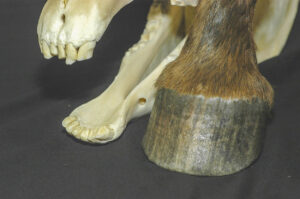Foals are Interferon-Gamma Deficient at Birth
Newborn foals are deficient in a certain protein released by white blood cells that is essential for protection against the bacterium Rhodococcus equi and other pathogens, stated scientists at the University of Kentucky’s Gluck Equine
- Topics: Article, Foal Care, Pneumonia (Rhodococcus)
Newborn foals are deficient in a certain protein released by white blood cells that is essential for protection against the bacterium Rhodococcus equi and other pathogens, stated scientists at the University of Kentucky’s Gluck Equine Research Center. Pneumonia caused by R. equi can be costly to treat, and fatal.
The researchers collected blood samples from a group of foals at regular intervals during their first six months of life, and blood and bronchoalveolar lavage samples from another group of foals at one, three, or six months of age. They looked for expression of interferon-gamma (IFNg), which is produced by certain white blood cells (called T-lymphocytes) and which fights viral infection by preventing virus multiplication.
“Why are young foals susceptible to different diseases, particularly R. equi?” questioned David Horohov, PhD, William Robert Mills Chair and professor at Gluck. “We do know based on the work of Dr. Steve Hines (of Washington State University) and Dr. Steeve Giguere (of the University of Florida) that adult horses are resistant to Rhodococcus in part because they produce a lot of INFg, the cytokine that determines resistance. Foals, however, are basically incapable of expressing the gene for IFNg.”
Horohov said a preliminary study completed on farms with endemic R. equi in Illinois agrees with the Gluck research: The foals with the lowest levels of IFNg at birth were more likely to become infected with R. equi
Create a free account with TheHorse.com to view this content.
TheHorse.com is home to thousands of free articles about horse health care. In order to access some of our exclusive free content, you must be signed into TheHorse.com.
Start your free account today!
Already have an account?
and continue reading.

Related Articles
Stay on top of the most recent Horse Health news with

















